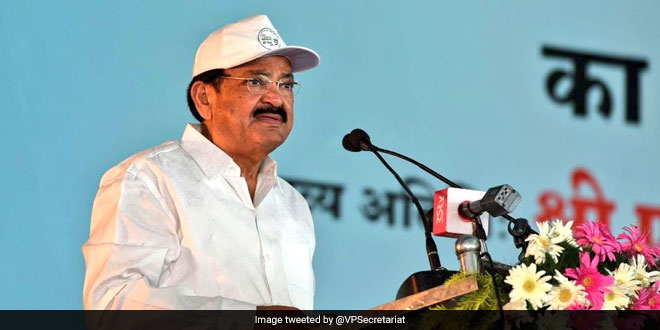New Delhi: “It is a matter of satisfaction that in the last four years, the country has adopted the Swachh Bharat calling of the Prime Minister and given it the nature of a mass movement. Community cleanliness cannot be obtained just by government programs. It needs public acceptance to be a mass movement”, said Vice President of India M. Venkaiah Naidu, speaking at the public-awareness-cum-awareness program under the ‘Cleanliness Service-2018’ organised by the Drinking Water and Sanitation Department in Lalkhatanga Panchayat, Ranchi, Jharkhand.
स्वच्छता सिर्फ सरकारी कार्यक्रम से नहीं प्राप्त की जा सकती है, जन-आंदोलन आवश्यक है जिसकी स्वीकार्यता मिली है।
यह प्रसन्नता का विषय है कि झारखंड के लोगों में स्वच्छता के प्रति जागरूकता है।
शौचालय का उपयोग करने के लिये लोगों को प्रेरित करें। @dasraghubar #SwachhtaHiSeva pic.twitter.com/nJlhfd3Plh— Vice President of India (@VPSecretariat) September 27, 2018
Shedding light on the achievements of the Swachh Bharat Abhiyan which has now turned into a mass movement, as touted by the Vice President, he said,
In 2014, when this campaign started, 30 per cent of the households had latrines in most of the provinces of the country. In Jharkhand, sanitation coverage was less than 30 per cent of the average. In the last four years, this average has reached more than 90 per cent. This increase in Jharkhand is more than double. In the past four years, nearly 14 million toilets have been constructed in the country. 8 million domestic toilets have been built in rural areas. 60 per cent of the country’s villages have been declared as Open Defecation Free (ODF). 4.5 lakh villages and 459 districts and 21 states have been declared ODF.
Highlighting the benefits of safe sanitation, the Vice President referred to UNICEF’s study and said,
With cleanliness a family can save Rs. 50,000, otherwise spent on treatment. In India, around 1 lakh children die every year due to diarrhea.
While addressing the people, he also stated the study done by the Asian Development Research Institute (AADRI) which states how awareness has increased among women’s groups and cases of different diseases has decreased. He said,
Awareness and insistence towards community and personal cleanliness has increased in the women’s groups. In the last years, cases of diarrhea have decreased by 23 per cent and anemia has been reduced by 10 per cent. These findings are hopeful for the future.
Replying to generally asked question, doubt and complaint of citizens that toilets are only on government papers and not in reality, the Vice President told that geo-tagging of newly constructed toilets is being done. He said,
Maintenance, repair and quality of toilets is essential for the sustainable success of this (Swachh Bharat Abhiyan) mass movement.
To ensure a city or a state is actually ODF, the Vice President suggested third party verification before any declaration. He suggested regular supply of water to be one of the mandates for ODF declaration. He said,
Local bodies should run continuous awareness programmes and inspire people to use toilets.
Also Read: In Jharkhand’s Giridih District, Women Break Into Male Bastion And Turn Masons To Construct Toilets
Amidst this, the Vice President expressed his concern towards unlawful manual scavenging and deaths of workers. He said,
This inhuman practice must end immediately. In spite of the law, continuation of this practice raises questions about the morality of our society and the commitment of the government towards the law. The death of manual scavengers creates suspicion on us being civilised.
He also talked about the current status of solid and wet waste management in India. He said, in cities, door-to-door waste collection is being done only in 68 per cent of the wards. Only 23 per cent of the collected waste is processed.
Also Read: Human Waste Turned Into Manure Is Being Used For Farming: A Success Story From Jharkhand
As part of ‘Swachhata Hi Seva’ awareness programme at Lakhatanga in Ranchi, Jharkhand, the Vice President participated in construction of sanitation pit and plantation drive.
Participating in construction of Sanitation Pit, as part of Swachha Hee Seva 2018 awareness programme at Lakhatanga, Ranchi, Jharkhand today. @dasraghubar #SwachhtaHiSeva pic.twitter.com/qlI8pTsyPn
— Vice President of India (@VPSecretariat) September 27, 2018
Planting a sapling at Lakhatanga village, in Ranchi, Jharkhand as part of Swachhta Hi Seva 2018 awareness programme today. @dasraghubar #SwachhtaHiSeva pic.twitter.com/Jwu8KHTPRM
— Vice President of India (@VPSecretariat) September 27, 2018
NDTV – Dettol Banega Swachh India campaign lends support to the Government of India’s Swachh Bharat Mission (SBM). Helmed by Campaign Ambassador Amitabh Bachchan, the campaign aims to spread awareness about hygiene and sanitation, the importance of building toilets and making India open defecation free (ODF) by October 2019, a target set by Prime Minister Narendra Modi, when he launched Swachh Bharat Abhiyan in 2014. Over the years, the campaign has widened its scope to cover issues like air pollution, waste management, plastic ban, manual scavenging and menstrual hygiene. The campaign has also focused extensively on marine pollution, clean Ganga Project and rejuvenation of Yamuna, two of India’s major river bodies.






























